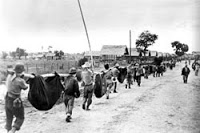Social Sciences
 Former POW rejects idea that DPJ is anti-American
Former POW rejects idea that DPJ is anti-American
- Japan?s War Legacy
Dr. Tenney & PM Abe April 29, 2015The postwar generation may now be the majority in Japan, but they too must know the atrocities of war. By LESTER TENNEY Dr. Tenney served in the 192nd Tank Battalion of the U.S. Army and survived the Bataan Death...
- Japan's Deniers Use Anti-semitism
In the October 2012 issue of the popular Japanese monthly magazine, Seiron, is an unattributed commentary on the Bataan Death March. The author dismisses the brutality of the March by asserting that the Americans were racist cowards and prevaricators...
- The History Card
To Order It did not matter much which DPJ candidate was elected party president. And it is unlikely that Ozawa?s challenge was serious. It may have been more a tactic than strategy. The result of the DPJ presidential election is that Japanese voters now...
- Only After 65 Years
APP advises members of congress and members of the Washington policy community on issues where Japan's war history intersects with current efforts to establish a successful East Asian regional security strategy. Last week Representative Mike...
- Japanese Companies Should Apologize Former Pow Says
Dr. Lester Tenney, past president of the American Defenders of Bataan and Corregidor and APP member was a prisoner of Imperial Japan from 1942 to 1945. He is a survivor of the Battle of the Philippines, the infamous Bataan Death March, Camp O'Donnell,...
Social Sciences
DPJ is not anti-American
 Former POW rejects idea that DPJ is anti-American
Former POW rejects idea that DPJ is anti-American By LESTER TENNEY
Special to The Japan Times
Dr. Tenney, a survivor of the Bataan Death March is a member of Asia Policy Point
CARLSBAD, Calif. ? As a survivor of Imperial Japan's infamous prisoner-of-war camps, forced labor at a Mitsui coal mine in Fukuoka and the horrors of the Bataan Death March in the Philippines, I know anti-Americanism when I see it. Some say the ruling Democratic Party of Japan is anti-American. I know that it is not.
...
Japan over the past 15 years has spent more than $14 million to invite 1,200 former POWs and their families from the United Kingdom, the Netherlands, Canada, Australia and New Zealand to visit Japan as well as to support archival research on POWs held by Japan. I told Diet members and journalists that by being excluded from the initiative, we American former POWs felt abused once again.
I recalled the words of the Japanese commandant at our first POW camp, who bellowed that Americans were "lower than dogs" and that Japanese "would never be friends" with them. The DPJ members with whom I talked were all embarrassed to learn this and promised to do what they could to correct this slight to Americans ? now Japan's closest ally.
The DPJ members I know are working hard to restore trust between the U.S. and Japan damaged by a long failure of Japan to acknowledge its past. There is no doubt that recognizing the plight of American POWs represents the foundation of the U.S.-Japan Alliance.
...
The DPJ members I know are working hard to restore trust between the U.S. and Japan damaged by a long failure of Japan to acknowledge its past. There is no doubt that recognizing the plight of American POWs represents the foundation of the U.S.-Japan Alliance.
###
Picture: The picture above is of the burial detail at Camp O'Donnell, the first POW camp for the survivors of the Bataan Death March and where Dr. Tenney was told he was lower than a dog. Until recently, AP identified the picture as simply one of the March. This was recently corrected by AP, although many POW memoirs, such as Samuel B. Moody's Reprieve From Hell (New York: Pageant Press, 1961) identify the picture correctly. Mr. Moody ended the war at Narumi POW Camp where he was a forced laborer for Nippon Sharyo, the rail car maker.
- Japan?s War Legacy
Dr. Tenney & PM Abe April 29, 2015The postwar generation may now be the majority in Japan, but they too must know the atrocities of war. By LESTER TENNEY Dr. Tenney served in the 192nd Tank Battalion of the U.S. Army and survived the Bataan Death...
- Japan's Deniers Use Anti-semitism
In the October 2012 issue of the popular Japanese monthly magazine, Seiron, is an unattributed commentary on the Bataan Death March. The author dismisses the brutality of the March by asserting that the Americans were racist cowards and prevaricators...
- The History Card
To Order It did not matter much which DPJ candidate was elected party president. And it is unlikely that Ozawa?s challenge was serious. It may have been more a tactic than strategy. The result of the DPJ presidential election is that Japanese voters now...
- Only After 65 Years
APP advises members of congress and members of the Washington policy community on issues where Japan's war history intersects with current efforts to establish a successful East Asian regional security strategy. Last week Representative Mike...
- Japanese Companies Should Apologize Former Pow Says
Dr. Lester Tenney, past president of the American Defenders of Bataan and Corregidor and APP member was a prisoner of Imperial Japan from 1942 to 1945. He is a survivor of the Battle of the Philippines, the infamous Bataan Death March, Camp O'Donnell,...
